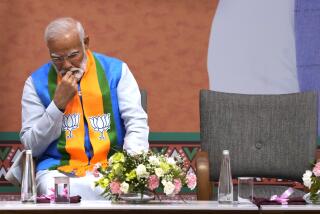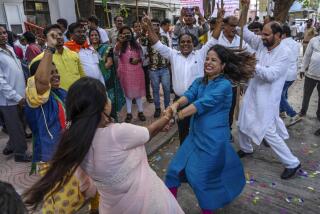Dissatisfied Voters May Turn on Gandhi : India: The prime minister has been hurt by unfulfilled promises and charges of corruption. Now he could lose a parliamentary election.
- Share via
HAIDARGARH, India — Stuck in a long line of ox carts, camels, cars, trucks and buses waiting for a train to pass, the young farmer leaned against his battered tractor here in the politically strategic north India heartland and considered what this week holds for embattled Prime Minister Rajiv Gandhi.
“The corruption is just too much now,” the farmer said, as several drivers nearby nodded in agreement. “Sugar prices are so high, we are taking our tea plain and bitter now. It is only the rich who can afford the sweet things of life.
“The rich have done well with this Rajiv Gandhi. But us, we farmers, our lives are much the same as they’ve always been. He promised us so much, this young prime minister, but he gave us so little.
“No, Rajiv’s time has come and gone. It’s time for a change.”
As India’s half-billion voters begin trooping to the polls today in a weeklong national election that is likely to alter the political landscape of the world’s most populous democracy, analysts, political pollsters and many voters believe the sentiments expressed by the frustrated farmer are all too common among India’s massive body politic.
Two polls released independently in the past week predicted that Gandhi and his ruling Congress-I party will, for only the second time in the history of independent India, lose their ruling majority, which they won most recently in December, 1984. In that vote, a younger and more idealistic Rajiv Gandhi swept 415 of the Parliament’s 545 seats after his mother, Indira Gandhi, was assassinated. His campaign theme then was to promise the nation a new era of high technology, economic liberalization and political honesty.
Now, deeply concerned about renewed allegations of massive, high-level corruption under his administration and frustrated by promises unfulfilled, Indian voters are likely to vote for a fundamental change, the pollsters said.
The polls show Gandhi having lost key traditional support from northern Indian farmers, from low-caste minority Hindus, from the nation’s Muslim minority, which has always voted as a bloc, and from the growing urban middle class. This combination, the pollsters concluded, is likely to leave Gandhi’s party with as few as 180 seats in Parliament.
Even with so few seats, the Congress-I may still emerge as the single largest party. But such an outcome would trigger a period of political instability in which coalitions would form and fall and Gandhi’s position as head of government clearly would be in danger, analysts said.
Gandhi has publicly ignored the warning signs and trends, predicting an overwhelming victory and dismissing the usually reliable pollsters with a wave of the hand.
“Polls don’t vote; people vote,” Gandhi said curtly at a brief Sunday morning news conference in New Delhi, arguing that the voters have “tremendous doubts” about the opposition.
Opposing Gandhi is a rainbow coalition of political foes. Some of them are old enemies of the Congress-I, members of the grouping that defeated Indira Gandhi in 1977 and ruled for three years before they collapsed in infighting. But many are newcomers, longtime Rajiv Gandhi loyalists who fled the prime minister’s ranks in outrage, disillusionment or personal ambition during his five-year tenure.
The leader of the opposition coalition is now Gandhi’s own former defense minister, Vishwanath Pratap Singh, who is variously described as “a breath of fresh air” or “the only honest man in Indian politics.” Singh is nondescript, soft-spoken and lacks the charisma and political acumen of previous Indian leaders.
Singh resigned from Gandhi’s Cabinet and was expelled from the party in 1987 after uncovering evidence that massive bribes were paid, possibly to the prime minister himself, on an arms deal that Gandhi had signed with the Swedish firm Bofors. He has brought a new dimension to Indian politics.
Singh and the National Front coalition that was cobbled together from his own Janata Dal Party, powerful regional parties, India’s Communist Party and the growing right-wing Hindu revivalist party have picked as their slogan izzat --or honor of the nation.
“The dignity of the country has suffered under Rajiv Gandhi,” Singh said while on the campaign trail recently in his home district. “It’s true, corruption may be everywhere in India, but everyone expects that it won’t be at the top. Here, even a corrupt person expects an honest government.”
Political analysts say Singh and his coalition have managed to make corruption a key issue.
“I think this is a watershed election,” said Surjit Singh Bhalla, an economist and prominent pollster who was among Gandhi’s many fervent supporters in 1984. “It is both a judgment of where India has been and a prediction of where India will be going.”
For other nations, Bhalla said, there is little at stake. Both Congress-I and the opposition are likely to continue similar policies of economic liberalization that have brought India to the brink of an economic boom. And their foreign policies appear to be similar.
“What is at stake are the values and the checks and balances in our political life,” Bhalla added. “This society has gone . . . downhill in the past five years. A revolution of expections has been denied. Very objectively, I think the Indian polity is on trial. Our whole system is on trial--and we can either save ourselves or hang ourselves.”
More to Read
Sign up for Essential California
The most important California stories and recommendations in your inbox every morning.
You may occasionally receive promotional content from the Los Angeles Times.










